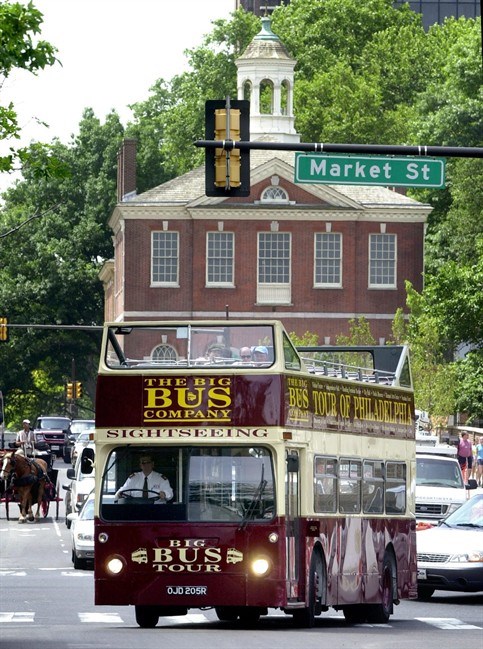SAVANNAH, Ga. - A proposal to put double-decker tour buses on the streets of Savannah's historic district has residents rallying to bring the plans to a screeching halt, with critics fearing the buses would hit ancient oak limbs and give sightseers a peeping Tom's view into Victorian homes.
Two Boston businessmen are lobbying Savannah City Hall to end a 17-year prohibition on double-decker buses in the coastal city's downtown historic district, which draws 12 million visitors a year. Savannah's Downtown Neighborhood Association is urging officials to deny the request.
Opponents say the buses, which would have passenger seats on an open-air top, could run into low-hanging branches along the edges of Savannah's manicured squares. And they complain the buses' elevated views would enable tourists to peer over garden walls and possibly into second-floor windows of private homes.
"What this company is asking us to do is to change our rules so we can be more like everywhere else, when what draws people to Savannah is that we're not like anywhere else," said Bob McAlister, who lives in an 1853 row house on Gordon Street in the heart of downtown. "The double-decker buses threaten Savannah's special ambience, its livability. It's not Colonial Williamsburg. It's not New York."
Steve Caplan and Tom O'Connor, the Boston investors, argue they shouldn't be kept out of the city's lucrative tourism market — worth $2 billion in 2011 — because of a blanket ban.
The partners say they're having four buses built to custom specs in England. While they would hold 75 passengers, double the capacity of the tour trolleys Savannah is used to, the buses would stand 12 1/2 feet tall. That's a foot below the minimum clearance the city requires for maintaining its tree canopy, though residents insist some branches hang lower.
Julie Wade, a Savannah attorney hired by the business partners, said concerns about privacy were overblown.
"We're not running a peeping Tom tour. The buses will be lower than most second-floor windows," Wade said. "This isn't going to dramatically change people's privacy. Right now you can see right across the street into other people's properties."
Residents learned in December that City Council was weighing a request by the business partners. In some ways, their timing could hardly have been worse.
An advisory committee established by City Hall has spent nearly a year studying broader tourism issues, including whether Savannah should put a cap on tour companies after explosive growth over the past decade. The committee is expected to report back with recommendations in February.
The city says 96 motorized tour vehicles — from trolleys and small buses to a hearse that carries sightseers instead of caskets — were operating last year compared to just 40 in 2002. And those numbers don't include horse-drawn carriages, walking tours and other operators who show off Savannah's sights without guzzling gas.
"We want to make sure the area's not totally saturated with tour vehicles," said Hank Reed, president of Savannah's Downtown Neighborhood Association. "Every company now is trying to pile on because Savannah's such a hot market."
Most of the traffic centres on the 2.5 square miles of Savannah's National Historic Landmark District. A treasure trove of homes and buildings dating from the colonial 1700s to the 1890s, downtown Savannah is the largest area recognized as a historic landmark by the U.S. government.
Of course, London and Paris are famous for their double-deckers, and the buses have become a hit with tourists in New York and Los Angeles. They're not as common in smaller Southern cities that draw visitors with their historic homes and charming cityscapes.
A double-decker bus service launched in New Orleans in September, but it sticks to major streets on the perimeter of the city's famed French Quarter. Savannah's colonial-era neighbour, Charleston, S.C., doesn't have double-deckers and only allows smaller buses with room for 20 to 45 passengers to tour its historic residential neighbourhoods.
The businessmen eyeing Savannah for double-deckers had hoped to win final approval at the City Council's upcoming meeting Thursday. But complaints from residents prompted the mayor and council members to apply the brakes and send the issue to its advisory committee, which hasn't given a recommendation.
Wade said her clients are willing to work with city officials and residents on compromises, such as possible route restrictions that would steer clear of some residential areas.
"People think they're exciting and they're fun," Wade said. "One of the reasons you bring something new to a community is why would you bring something they already have?"


